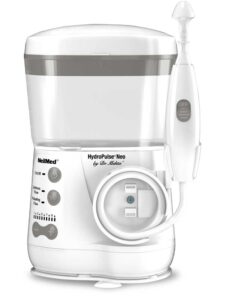Post nasal drip
Post nasal drip is an unscientific term that refers to the sensation of thick phlegm in the throat, which can become infected. It is annoying because normally the throat is moistened by the nasal secretions and throat mucous glands. This is part of the mucous – nasal cilia system that defends us from disease. When the amount of liquid secreted by the nose and sinus is reduced, and the cilia of the nose and sinus slow down, the fluid thickens and you become aware of its presence. Since the thick phlegm is unpleasant and often infected because it is “just laying there” and not moving, our bodies naturally try to get rid of it, to the annoyance of our partners. Whether caused by pollution, chemical exposure, or severe infection, the treatment requires that the cilia mucous system be brought back to normal.
Moisturizer spray is good, but avoid moisturizing sprays with additives or preservaties such as benzalkonium (which can actually be the root of your problems). I like preparations which you make yourself, so they’re economical, and which come with a refillable spray bottle. This allows you to moisturize and clean your nose frequently, right away when you are exposed to diesel bus fumes, smoke, or dust. If the stuff is expensive, or isn’t in a bottle convenient for carrying with you, you are less likely to use it right when you are dry or exposed to irritants. Look for a nasal/sinus moisturizer that contains no irritating additives, including Benzalkonium, and which comes in a convenient spray bottle for cleaning out your nose on the go. A good sinus moisturizer can be used as often as desired, and because it is free of irritating additives, there is no sting, so kids will use it.
Whatever helps to move the cilia helps post nasal drip. Drink lots of hot tea. Hot compresses over the nose, above and below the eyes helps restore ciliary function. Pulsatile Nasal Irrigation performed daily for 2 weeks is often sufficient because the pulsation encourages good ciliary movement. Stagnant mucous is also removed along with bacteria. Often the key is to simply drink enough water to liquefy the secretions.
What about coffee? There is nothing wrong with coffee, its just that tea is what is known to stimulate cilia movement. Also chicken soup. Ice drinks slow the cilia, and so do most antihistamines. Sometimes patients are taking a large number of various medications and these combine to make the nose dry. Here, pulsatile irrigation is probably the best treatment.

